
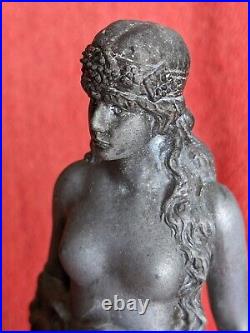
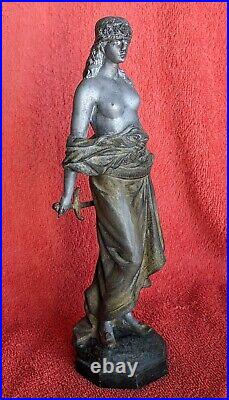
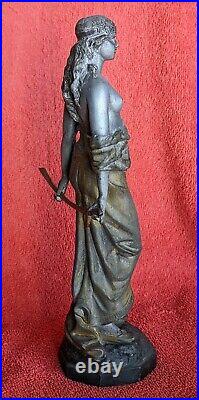
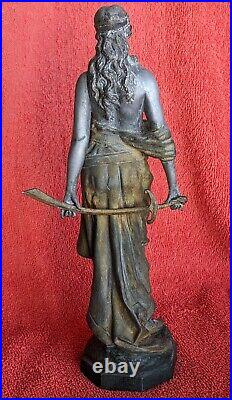
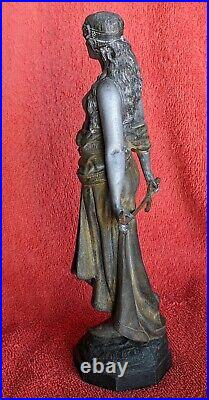
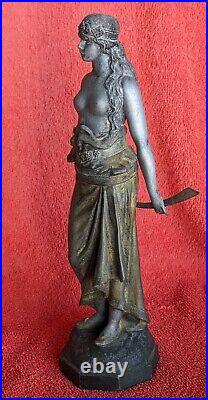
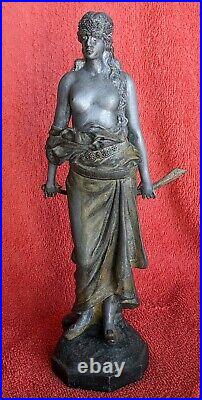
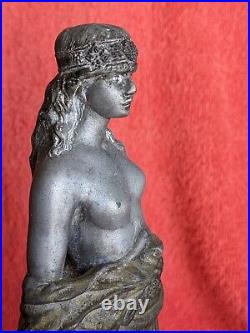
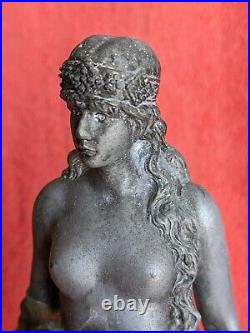
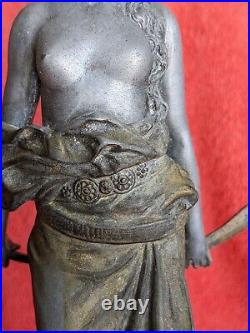
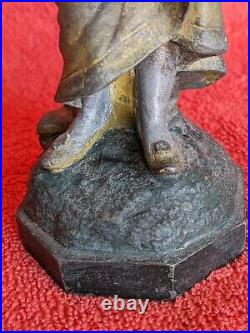
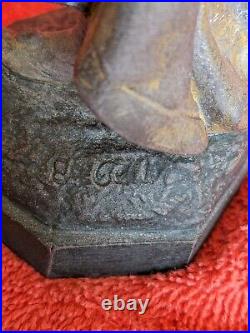
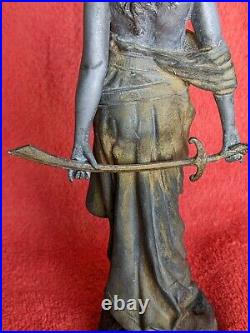
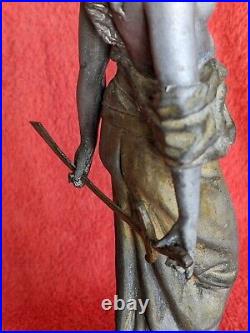
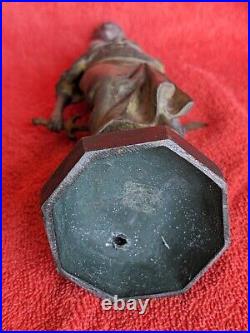
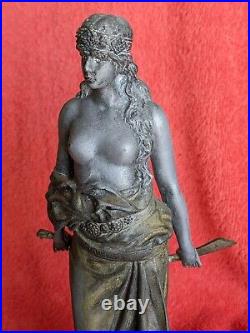
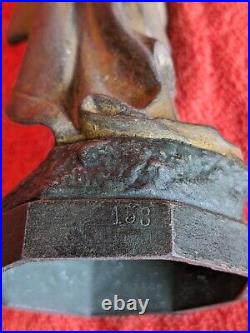


Read english presentation below. Judith s’apprêtant à décapiter le général Holopherne. Statuette Art Nouveau (1905). Personnage biblique, héroïne du peuple juif. Judith, une jeune veuve, vit à Béthulie, en Palestine. Pour sauver son peuple attaqué par les Assyriens, elle décide d’assassiner leur chef, le général Holopherne. Au cours d’un festin, la belle le séduit et le suit dans sa tente, le fait boire, puis profite de son sommeil pour le décapiter. Petite sculpture en régule à patine dorée sur le vêtement, signée au dos de la terrasse. Époque Art Nouveau (circa 1905). Le sabre oriental (cimeterre) est mobile mais pas détachable. Hauteur : 22 cm y. Le régule est un alliage d’étain ou de zinc et d’antimoine. Le nom vient du latin « regulus » qui se traduit par « prince » ou « petit roi ». Le régule était ainsi le « petit roi » des métaux selon certains alchimistes (l’or étant naturellement le roi des métaux). La statuette sera très soigneusement emballée afin de ne subir aucun dégât durant le transport. L’histoire de Judith et Holopherne. Nabuchodonosor, roi de Ninive, charge Holopherne, général en chef de ses armées, de châtier les pays, dont la Judée, qui lui avaient refusé leur aide dans sa lutte contre le roi d’Ectabane. Semant la terreur sur leur passage, les troupes assyriennes mettent le siège devant la ville de Bethulie où les israélites s’étaient réfugiés. Dans cette ville vit Judith, riche, belle et pieuse veuve, faisant retraite, jeûnant et portant un cilice depuis la mort de Manassé son mari. Apprenant que, faute d’eau, la ville voulait se rendre, elle convoque chez elle les Anciens, et leur reprochant leur manque de confiance en Yaweh, elle leur annonce qu’elle se rendra dans le camp ennemi pour y accomplir un exploit qui les délivrera des assiégeants. Après avoir imploré Dieu, Judith quitte ses vêtements de deuil, et revêtue de parures destinées à attirer le regard des hommes, accompagnée de sa servante Abra, la surintendante de tous ses biens, elle quitte la ville pour le camp ennemi. Amenée devant Holopherne elle lui annonce la chute prochaine de la ville, car Yaweh s’est détourné de ses habitants qui, torturés par la faim et la soif, ne suivent plus les interdits alimentaires de la Loi. Elle demande à Holopherne une tente pour s’y isoler dans la journée et l’autorisation de sortir le soir du camp, seule avec sa servante, pour y prier Dieu et attendre qu’Il lui annonce que le moment de s’emparer de la ville est venu. Au 4ème jour, Holopherne la pria d’assister au festin qu’il donnait sous sa tente à ses officiers. Le soir venu, celui-ci fit sortir tous ses gens pour rester seul avec Judith, car il la désirait. Mais ayant trop bu, il restait effondré sur son lit, et Judith put ainsi s’emparer de l’arme du général et, le saisissant par les cheveux, il lui suffit de deux coups de cimeterre pour le décapiter. Elle tendit alors la tête à sa servante, restée devant sa tente, qui la mit dans le sac où elles tenaient leurs provisions. Les deux femmes purent sortir du camp sans être inquiétées car c’était leur habitude depuis 3 nuits. Judith rentra dans Bethulie sous les acclamations de la foule car le chef des armées d’Assour avait succombé sous la main d’une femme restée pure, et ce malgré les désirs d’Holopherne dont la tête fut suspendue aux remparts de la ville. Au lever du jour lorsque les assyriens virent ce spectacle, démoralisés, ils prirent la fuite poursuivis par les troupes d’Israël qui firent ainsi un riche butin. Après cette victoire, Judith vécut honorée et respectée par tout le pays avant de mourir à l’âge de 105 ans puis d’être enterrée dans la tombe de son mari. Judith preparing to behead General Holopherne. Judith is a biblical character, a heroine of the Jewish people. Judith, a young widow, lives in Bethulia, Palestine. To save her people from the Assyrian attack, she decides to assassinate their leader, General Holopherne. During a feast, she seduces him and follows him into his tent. After making him drink, she takes advantage of his sleep to behead him. Small sculpture made of spelter, gilted on the garment, signed on the back of the terrace. Art Nouveau period (circa 1905). The oriental saber (scimitar) is movable but not detachable. Height: 22 cm including the terrace. Spelter, an alloy of tin or zinc and antimony, was considered to be the « little king » or « prince » of metals by some alchemists (with gold being naturally the king of metals). The statuette will be carefully packaged to avoid any damage during transportation. The Story of Judith and Holopherne. Nebuchadnezzar, the king of Nineveh, orders Holopherne, the commander-in-chief of his armies, to punish the lands, including Judea, which had refused to aid him in his struggle against the king of Ectabane. Spreading terror in their wake, the Assyrian troops lay siege to the city of Bethulia, where the Israelites have sought refuge. In this city lives Judith, a wealthy, beautiful, and devout widow who has been fasting and wearing sackcloth since the death of her husband, Manasseh. Learning that the city is about to surrender due to a lack of water, she summons the Elders to her home and reproaches them for their lack of faith in Yahweh. She declares that she will go to the enemy camp and perform a deed that will deliver them from the besiegers. After imploring God’s help, Judith discards her mourning clothes and adorns herself to attract men’s attention. Accompanied by her servant Abra, the overseer of all her possessions, she leaves the city for the enemy camp. Presented before Holopherne, she predicts the imminent fall of the city, as Yahweh has turned away from its inhabitants who, tortured by hunger and thirst, no longer abide by the dietary laws of the Law. She asks Holopherne for a tent to isolate herself during the day and permission to leave the camp in the evening, alone with her servant, to pray to God and wait for His sign to seize the city. On the fourth day, Holopherne invited her to the feast he hosted in his tent for his officers. When evening came, he dismissed all his men to be alone with Judith, as he desired her. However, having drunk too much, he collapsed on his bed, allowing Judith to take hold of the general’s weapon. Gripping him by his hair, she decapitated him with two strikes of the scimitar. She then handed the head to her servant, who had stayed outside the tent, and they placed it in the sack where they kept their provisions. The two women were able to leave the camp without being bothered, as they had done for the past three nights. His head was suspended on the city walls. At dawn, when the Assyrians saw this sight, demoralized, they fled, pursued by the troops of Israel, who seized a rich booty. After this victory, Judith lived honored and respected throughout the land until she died at the age of 105, and she was buried in her husband’s tomb.
